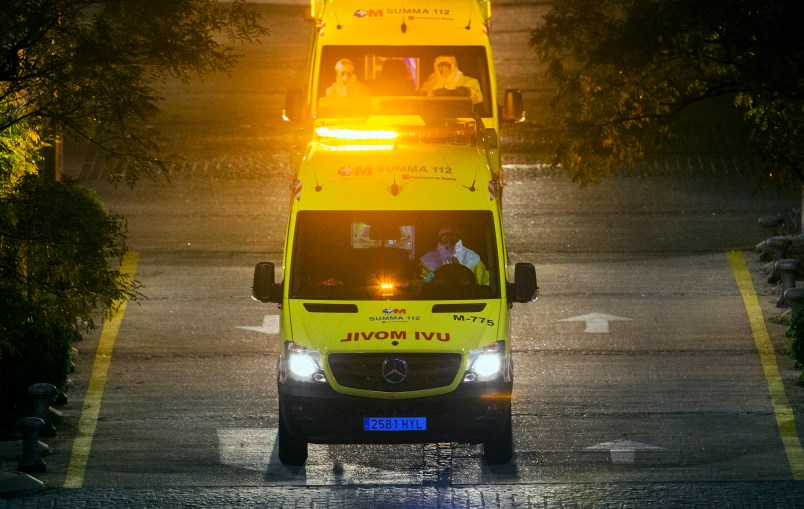MADRID (AP) — A Spanish nursing assistant may be the first person in the ongoing epidemic to catch Ebola outside of Africa, but she probably won’t be the last, experts warn.
Still, even as more people with Ebola arrive on European shores, the continent’s sophisticated health systems, legions of doctors and nurses and preparedness plans will probably squash any big outbreaks of the lethal virus.
Extremely high vigilance is needed when caring for people with Ebola, so doctors say an accidental infection among health staff, as is the case in Spain, isn’t surprising.
“What happened in Spain is unfortunate but given the size of the outbreak in West Africa, we can expect to see more cases in different countries, including in Europe,” said Dr. Isabelle Nuttall, a director at the World Health Organization tasked with helping prepare countries for Ebola. West Africa is currently battling the biggest-ever outbreak of Ebola, which doubles in size roughly every three weeks.
WHO earlier issued guidelines for all countries on how to prepare for the arrival of suspected and confirmed cases and the agency doesn’t see any reason to change that advice in the aftermath of the Spanish infection, Nuttall said.
“At the top of the priority list is good training and infection-control practices before any Ebola cases arrive,” Nuttall said. She said the agency’s efforts were focused on helping countries in Africa. “We’re not too worried about preparations in Europe,” she said.
Teresa Romero, the infected Spanish nurse, said in an interview with Spain’s Cuatro television channel she had received training about how to put on and remove her protective hazmat suit when dealing with Ebola patients. She declined to give an opinion about whether that training was adequate.
In Madrid, Dr. German Ramirez of the Carlos III hospital said Romero remembers she once touched her face with her glove after leaving the quarantine room where an Ebola victim was being treated.
Health officials say Romero twice entered the room of Spanish missionary Manuel Garcia Viejo, who died of Ebola on Sept. 25 — once to change his diaper and again after he died to retrieve unspecified items. Ramirez said Romero believes she touched her face with the glove after her first entry.
At a meeting of the European Commission’s Health Security Committee, Spain said five “high-risk” contacts of Romero are being monitored but only her husband is under quarantine.
“I think what’s happened in Spain is likely to happen in a number of other countries but I don’t think it will lead to further onward transmission,” said David Moore, a professor of infectious diseases at the London School of Hygiene and Tropical Medicine. “We are all now on increasingly high alert so the likelihood someone will slip through the net is more and more unlikely,” he said.
Moore said there is a rigorous process in Britain for handling suspected Ebola patients and doctors can call a specialist referral service for advice, which will dispatch trained professionals if patients need to be isolated or tested.
He called the response to the Spanish case an overreaction.
“We need to know how (the infection) happened but I don’t think there’s any reason to change our protocols,” he said. “There will certainly be similar cases in the future, but we will not see an outbreak in Europe on the scale of what’s happened in West Africa.”
___
Cheng reported from London. AP Writers Barry Hatton in Lisbon, Portugal, Ciaran Giles in Madrid and Raf Casert in Brussels also contributed to this report.
Copyright 2014 The Associated Press. All rights reserved. This material may not be published, broadcast, rewritten or redistributed.







Clearly it’s time to ban all flights from Europe. Why won’t Obama lead?